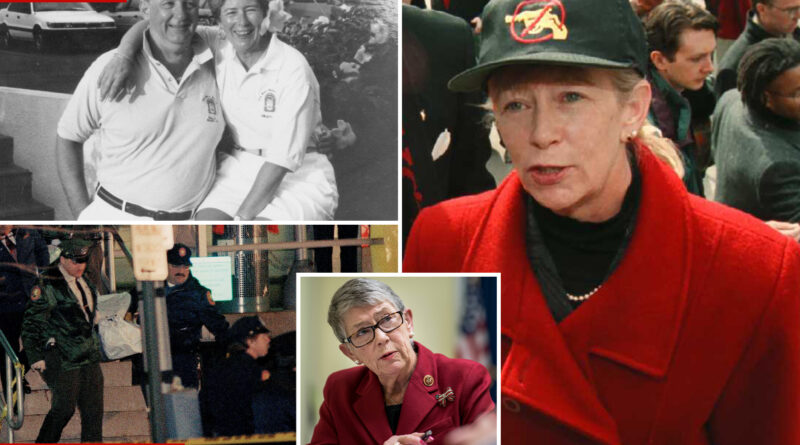The personal tragedy that defined Long Island Rep. Carolyn McCarthy’s legacy

Former Long Island Rep. Carolyn McCarthy, who died last week, built a legacy on gun-control advocacy — after her husband was killed and son gravely wounded in the 1993 LIRR Massacre.
McCarthy, who died Thursday at age 81, instantly became a grieving face of the gun crisis — and eventually entered politics over the issue — after 35-year-old madman Colin Ferguson launched his murderous spree aboard a train during the evening rush, killing six people and wounding 19 others.
“I always worried about who will speak for the victims,” said McCarthy, a former nurse, shortly before retiring from the House in 2015 after a nearly 20-year stint that earned her the nickname “the gun lady.”
On Dec. 7, 1993, Ferguson boarded the Hicksville bound-train from Penn Station at the Merillon Avenue stop in Garden City, LI, then calmly walked down the aisle of the third car, pulled out a gun and opened fire on roughly 80 passengers, including McCarthy’s loved ones.
The train car’s aisles became “literally littered with bodies” as bullets tore through it, said survivor Tom McDermott, who took a shot to his left shoulder.
Commuter Joseph Giugliano remembered watching in horror as the gunman drew closer, killing the woman sitting next to him as she tried to crawl away.
The victim, Maria Magtoto, a 30-year-old lawyer from Westbury, LI, lifted her head as she was crawling — with Ferguson just feet away, the witness said in a 2013 interview.
“Before you know it, she looked up, and he was maybe 8 to 10 feet away, and he pointed and shot her, shot her in the head,” Giugliano said. Her head exploded right next to me. … It was horrible.
“At that instance I looked up, and there he was, looking at me staring at me straight in the face. I said, ‘Dear God, I’m dead.’ ”
Luckily, the rider survived with a bullet that ripped through his arm and into his chest — the final shot fired before Ferguson’s 15-round magazine ran dry and three passengers bravely lunged at him and tackled him to the ground.
“It’s like a black cloud that follows me,” survivor Lisa Combatti, who was pregnant at the time, recently told The Post of the shooting. “It’s like waiting for a stomach ache to pass.”
McCarthy’s husband and son commuted every day together to Prudential Securities in Midtown, where Dennis was a manager and Kevin worked as a broker for the same firm.
The pair were headed home as usual to Mineola, usually about a 40-minute train ride, when the carnage unfolded.
Inside Ferguson’s pocket, cops found a collection of rambling, hate-filled notes that painted a chilling picture of the black man’s motives, with him blaming “racism by caucasians and Uncle Tom Negroes.
“NYC was spared because of my respect for Mayor David Dinkins and Comm. Raymond Kelly,” one note read. “Nassau County is the venue,” another declared — as casually as if he were picking a spot for a birthday party.
At the time, mass shootings were comparatively rare, especially in New York.
Ferguson was ruled mentally competent to stand trial, where he chose to represent himself in court, turning the proceedings into a bizarre spectacle before ultimately being convicted of six counts of murder and sentenced to 315 years behind bars.
Now nearly 70, Ferguson is serving his time at the Upstate Correctional Facility in Franklin County — a prison known for housing inmates with disciplinary issues. He has continued to insist he is innocent, telling The Post in an interview five years after the bloodbath that the whole thing was a “conspiracy.
“It was the finale of the setup. I was on the train, yes, but I was not responsible for that terrible incident,” he claimed.
McCarthy, a Republican turned Democrat, ran for office in 1997, winning the seat by 17 points in a deep-red district that she held onto for nearly 20 years.
She helped successfully pass legislation in 2007 that beefed up background checks on gun buyers while tirelessly fighting for other control measures before her retirement at the start of 2015, following a lung-cancer diagnosis.
Her son, Kevin, had 10% of his brain destroyed by one of Ferguson’s bullets and was given just a 1 in 10 chance of survival when he was shot.
McCarthy, recalling the efforts to save her son, told Newsday in 2018, “When I saw Kevin coming out of the operating room, I didn’t even recognize him.
“When he opened his eyes, I said — and this is the mother talking, not the nurse – ‘I’m going to make sure he survives.”
As for Combatti, despite the trauma she endured, she said she still rides the same 5:33 p.m. train every anniversary and sits in the same seat.
“It’s my act of defiance,” she said.
